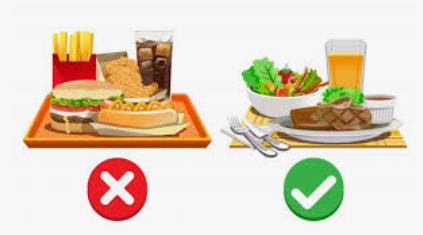Healthy Food vs. Junk Food: A Thousand Words on Nourishment and Well-being
In the realm of nutrition, the choices we make can have profound implications for our health, vitality, and overall well-being. In just a thousand words, let us delve into the contrasting worlds of healthy food and junk food, exploring their impact on our bodies, minds, and society at large.
Healthy food, the cornerstone of a balanced diet, is characterized by its nutrient density, providing essential vitamins, minerals, and antioxidants that fuel our bodies and support optimal functioning. From vibrant fruits and vegetables bursting with color to lean proteins and whole grains, healthy food offers a wealth of flavors and textures that delight the senses while nourishing the body from within.
At its core, healthy food is about more than just sustenance; it is a celebration of the abundance and diversity of nature, offering a cornucopia of flavors and culinary possibilities to explore. Whether it's savoring the sweetness of a ripe mango, the crunch of a crisp salad, or the warmth of a hearty bowl of soup, healthy eating is a sensory experience that delights the palate and nurtures the soul.
But the benefits of healthy food extend far beyond mere physical nourishment. Numerous studies have shown that a diet rich in fruits, vegetables, whole grains, and lean proteins is associated with a lower risk of chronic diseases such as heart disease, diabetes, and certain types of cancer. Moreover, healthy eating is linked to improved mood, cognitive function, and overall quality of life, providing a solid foundation for physical and mental well-being.
In contrast, junk food, characterized by its high levels of refined sugars, unhealthy fats, and empty calories, offers little in the way of nutritional value and can wreak havoc on our bodies and minds. From sugary sodas and greasy fast food to salty snacks and processed desserts, junk food tantalizes our taste buds with its addictive flavors and convenience but leaves us feeling sluggish, irritable, and unsatisfied.
Despite its appeal, junk food is a poor substitute for the nourishing sustenance provided by healthy alternatives. Consuming excessive amounts of junk food has been linked to a host of health problems, including obesity, heart disease, type 2 diabetes, and hypertension. Moreover, the addictive nature of junk food can lead to unhealthy eating patterns, contributing to a cycle of cravings, overeating, and weight gain that is difficult to break.
But the impact of junk food goes beyond individual health; it also has profound implications for society as a whole. The prevalence of cheap, unhealthy food options has contributed to a global epidemic of obesity and diet-related diseases, disproportionately affecting low-income communities and exacerbating existing health disparities. Moreover, the environmental toll of industrial agriculture and food processing, which often accompanies the production of junk food, further underscores the need for sustainable, health-promoting alternatives.
In the face of these challenges, the choice between healthy food and junk food is more than just a matter of personal preference—it is a reflection of our values, priorities, and commitment to well-being. By choosing to prioritize nutritious, wholesome foods and support sustainable food systems, we not only nourish our bodies but also contribute to a healthier, more equitable world for all.
Ultimately, the choice between healthy food and junk food is a choice between nourishment and depletion, vitality and lethargy, well-being and illness. As we navigate the complexities of modern life, let us strive to make choices that honor our bodies, our communities, and the planet we call home, knowing that in doing so, we sow the seeds of health, resilience, and abundance for generations to come.

